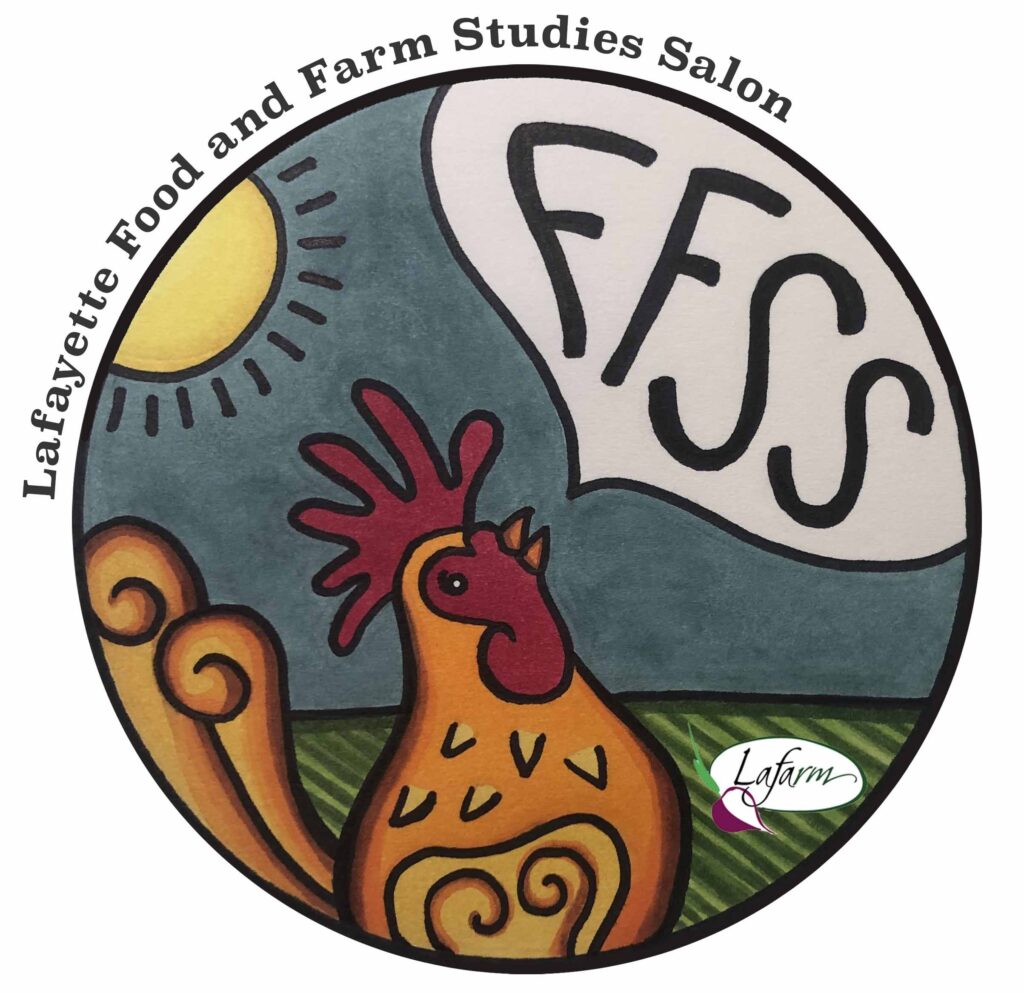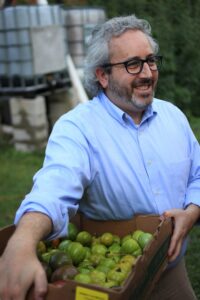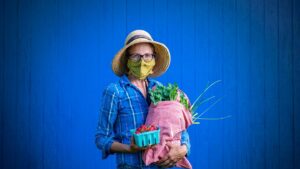Food & Farm Studies Salon provides online space for Lafayette community to connect and explore sustainability issues
By Stella Katsipoutis-Varkanis
There is something special to be said about working on LaFarm. Feeling the soil trickle through your fingers as you pick fresh produce from the vine. Pondering matters of food, farming, and sustainability under the wash of the golden sun. It was this bond between human and earth that students, faculty, and staff craved the most this spring, when the coronavirus forced the world to hunker down indoors and move operations online.
“The sense of loss and disconnection thrust upon us with COVID-19 left a space we wanted to fill,” says Benjamin Cohen, associate professor of engineering studies and environmental studies.
While nothing could replace the sensations of being physically present on the farm with like-minded peers, Cohen and Lisa Miskelly, assistant director of food and farm, sought—and found—a solution that would come as close as possible to doing so. Thus, the Food & Farm Studies Salon (FFSS) was born.
 A hybrid between a casual reading group and an open-ended discussion group, FFSS is a common online space where students, faculty, and staff alike can come together to keep up with issues related to food and farm studies. During weekly one-hour Zoom meetings, all participants share interesting, relevant content—which can come in the form of articles, podcasts, videos, etc.—and engage in conversations about the material.
A hybrid between a casual reading group and an open-ended discussion group, FFSS is a common online space where students, faculty, and staff alike can come together to keep up with issues related to food and farm studies. During weekly one-hour Zoom meetings, all participants share interesting, relevant content—which can come in the form of articles, podcasts, videos, etc.—and engage in conversations about the material.
So far, the group has covered topics like food waste, farm labor, immigration, racial injustice, regenerative agriculture, community gardens, school food, food apartheid, and more. Unlike a formal course, FFSS is not anchored by lectures and presentations. The goal, Cohen explains, is to build an online community of people interested in exploring and making progress on sustainability issues.

Benjamin R. Cohen
“We started the salon to provide a consistent anchor and check-in, no matter where anyone was, and to keep working on the things we all found important while we were on campus,” Cohen says. “Students couldn’t keep interning at the farm, working on food recovery, or working on campus with the Office of Sustainability, but they could consider how to do those things better in the future and to maybe do them back home.”
In addition, Miskelly explains that FFSS not only helped various student organizations—such as LaFFCo (Lafayette Food and Farm Co-op) and Food Recovery Network (FRN)—maintain a sense of direction and purpose during remote learning, but also gave students a way to continue cultivating friendships with one another.
“Once we went remote in March, our student clubs were a little unsure of how to stay engaged. Many took to Instagram for fundraising and education, but FFSS allowed us to maintain a deeper connection than social media,” she says.

Lisa Miskelly
“Our students feel kinship in one another in having a regular group of friendly faces to connect with each week, even if it is virtually, during a time when much of our world is shifting. While we’re not solving the world’s or the food system’s problems, we do offer another place to process what is happening externally and acknowledge the impact of those events internally, in hopes that we can then take action in our own communities.”
Anyone who is a part of the Lafayette community is welcome to participate in FFSS. Those who are interested in joining can email Cohen or Miskelly to receive an invitation to the weekly Zoom meetings. Participants are not obligated to attend; rather, Cohen says, “There isn’t pressure, it isn’t an assignment, and you don’t have to be an expert. The forum lets you know you aren’t the only one thinking about the issues.”
This no-pressure environment to share ideas, learn from one another, and foster relationships is what has student group members looking forward to the return of FFSS at the start of the fall semester.
“I love that FFSS lets us process the many layers of food and farm studies in a group of passionate people,” says environmental studies and anthropology major Sharon Engel ’22. “It’s helped me stay grounded in a time where I can really use that stability, and it’s been interesting talking about these food justice topics in the context of a pandemic. These are things I’ve been thinking and learning about, but not with as much collaboration and forward-thinking. This program was also amazing in helping me stay in touch with people who are very important to me on campus. It keeps me accountable, but not stressed out.”
“FFSS didn’t exist before COVID-19 and, for me, it has certainly been one of the bright spots to come out of this dark time. The passion we all bring to the discussions has made them a highlight of my online academic experience,” adds Maria Bossert ’23, who is the president of LaFFCo and has a double major in anthropology & sociology and government & law. “The practice of studying food and farming seems inaccessible without plants and soil in front of you, but FFSS helps many of us stay engaged with these topics from the comfort of quarantine. The issues we discuss are shaped by current events and have helped me connect to the world in more interesting and nuanced ways than I would have on my own.”
Cohen and Miskelly are hoping to even further expand FFSS this fall by inviting guest speakers to the meetings—such as authors of articles they study—and are optimistic that the program will carve out a permanent place for itself in the Lafayette campus experience, even well after quarantine is over.
“I hope FFSS might be one of the aspects of the pandemic that we carry with us after remote learning ends,” Miskelly says, “a space for open-ended dialogue and exploration around the work we are doing in our lives.”
 A hybrid between a casual reading group and an open-ended discussion group, FFSS is a common online space where students, faculty, and staff alike can come together to keep up with issues related to food and farm studies. During weekly one-hour Zoom meetings, all participants share interesting, relevant content—which can come in the form of articles, podcasts, videos, etc.—and engage in conversations about the material.
A hybrid between a casual reading group and an open-ended discussion group, FFSS is a common online space where students, faculty, and staff alike can come together to keep up with issues related to food and farm studies. During weekly one-hour Zoom meetings, all participants share interesting, relevant content—which can come in the form of articles, podcasts, videos, etc.—and engage in conversations about the material.
